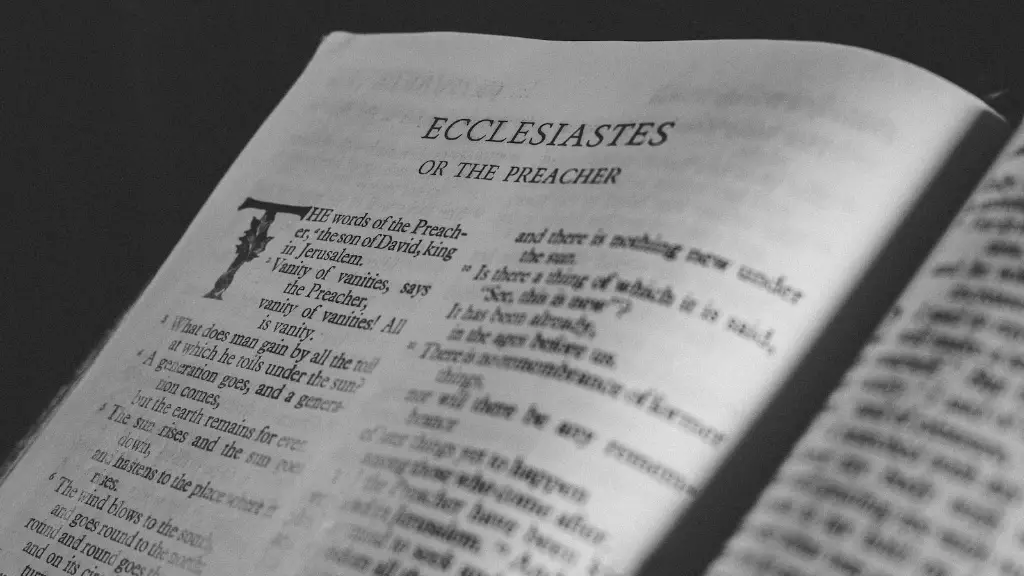Studying the Bible can often seem intimidating or overwhelming. Figuring out where to start can help make the task of learning about the Bible less daunting. The Bible has immense influence around the world and understanding the text of the Bible can be life changing for many people. There are several different methods to studying the Bible, from reading it from cover to cover to reading specific books or verses.
One of the best methods to begin studying the Bible is to start with the Gospels. The Gospels of Mark, Matthew, Luke, and John, form part of the New Testament, which is the second part of the Bible. Each of the Gospels cover the life, death, and resurrection of Jesus Christ. The Gospels are essential reading for anyone looking to gain an understanding of the foundations of Christianity. Following the Gospels, a reader can move onto the Acts of the Apostles, which aims to narrate the events following the resurrection of Jesus and the spread of Christianity throughout the ancient world.
After reading the Gospels, a reader then progress onto the Epistles. The Epistles are a series of letters written by the Apostle Paul and other Christian leaders. They contain valuable advice on how to live a Christian life. The Epistles are a great way to explore issues such as the importance of love and forgiveness, as well as other topics such as suffering and faith. Reading the Epistles can provide an insight into the theological foundations of Christianity, which can then be explored further.
Finally, it is always beneficial to explore other books within the Bible. There are a wide variety of books within the Bible and each them provides a valuable insight into the life and teachings of Jesus. The Old Testament, for example, is an important source of information about the history of Christianity and the people it impacted. Readings from the Psalms, the Song of Songs, and other books of the Old Testament can provide readers with crucial insight into the spiritual side of Christianity.
The Book of Genesis
The Book of Genesis is the first book in the Bible and is essential reading for any student of the Bible. The book covers the creation story, the story of the Patriarchs, and the emergence of the Hebrew nation. Genesis provides an essential insight into the origin of Christianity and provides a necessary background to the central themes of the Bible. A student of the Bible should take their time to explore this book and discover the central themes that can be found throughout it.
The Book of Genesis is divided into two primary sections. The first section covers the period before the Flood and recounts the creation of the universe and the first attempts at human civilization. The second section covers the period after the Flood and narrates the stories of the Patriarchs. This section is particularly important for its vivid portraits of figures such as Abraham, Isaac, and Jacob. They provide an insight into the ways that humans responded to the divine presence of God.
The Book of Genesis also provides a great opportunity for readers to explore the concept of human morality. The books of Genesis and Leviticus provide a detailed account of the laws given to the Hebrew nation by God. These laws are essential to understanding the nature of the divine and humanity’s relationship to the divine. They provide an insight into what it means to be a moral person and how to live a good life.
In addition, the Book of Genesis also provides a great opportunity for readers to explore the concept of faith. It is said that the entire Bible teaches one central truth – that the world was created by a divine being and that this divine being is responsible for all of the beauty and wonder we experience in the world. Reading the Book of Genesis can help teach readers the importance of faith and how it can be used to understand the world around them.
The Poetic Books
The poetic books of the Bible are also an essential starting point for anyone looking to study the Bible more closely. The poetic books include books such as Psalms, Proverbs, Ecclesiastes, and the Song of Songs. These books provide a wealth of insight into the relationship between humans and the divine. The Psalms are a collection of devotional poems written by different authors throughout the history of Israel. Reading the Psalms allows readers to explore what it means to connect to the spiritual world and to put one’s faith in a higher power.
The Proverbs are a collection of wisdom literature from the ancient Hebrew nation. They provide an essential insight into the values and beliefs of the Hebrews and how to live a moral and good life. The Proverbs seek to teach readers how to put their faith into action and how to live their lives in accordance with the will of God. The Proverbs are an essential source of wisdom for any student of the Bible.
The book of Ecclesiastes is a book that explores the philosophical implications of faith. It is written in a unique and thought-provoking style and seeks to explore the conceptual questions that come with faith in a divine being. Readings from Ecclesiastes can help to deepen a student’s understanding of the spiritual side of the Bible and to explore the meaning of life and death.
The Song of Songs, while often overlooked, is also an essential piece of literature when studying the Bible. The Song of Songs is unique compared to other books in the Bible because of its focus on love between a man and woman. It is a romantic and sensual book and provides readers with an insight into the beauty and complexity of human love and relationships. Reading the Song of Songs can be a great way to explore what it means to be in a relationship with another person and to better understand the power and beauty of love.
Study Tools
When studying the Bible, it is always important to make use of study tools. There are a number of tools available that can help readers to better understand the text of the Bible. Commentaries are particularly useful when studying the Bible. There are commentaries available on every book of the Bible and they provide an essential insight into the text and its deeper meanings. Commentary can help with the understanding of difficult passages and point the reader to other related passages. The use of devotionals can also be beneficial when studying the Bible. Devotionals provide readers with an opportunity to meditate upon the meanings and implications of particular passages.
It is also essential to use a good study Bible. A study Bible provides readers with a comprehensive look at the text. It includes maps, charts, and diagrams that can help to fully understand the text. A study Bible also includes helpful commentaries and other study tools that can be used to explore the meaning of particular passages. Using a study Bible can help make studying the Bible easier and more enjoyable.
Discussion
Many people find it helpful to study the Bible in a discussion or reading group. Groups provide an excellent opportunity to explore the Bible in an open and supportive way. It is possible to find reading groups or Bible studies in many churches and other places. Joining a discussion group allows for a deeper exploration of the Bible and its implications for a particular group. It is also a great way to meet other people and build relationships. Reading the Bible with others will often provide different perspectives that can help enrich a student’s understanding of the Bible.
It is also helpful to find a mentor or spiritual adviser who can help guide the student’s Bible studies. A mentor can provide insight and guidance into difficult passages and suggest topics to explore. Having a mentor is an invaluable resource and can often help a student to gain a deeper insight into the Bible and its teachings.
Memorization
Lastly, it is beneficial to engage in memorization when studying the Bible. Memorizing passages and verses can help to deepen a student’s understanding of the Bible and to integrate the text into their lives. Memorizing passages allows for a certain level of familiarity with the Bible and its concepts. Memorizing scripture can also help to combat anxiety and stress and to provide a sense of peace in life. Memorizing scripture is also a great way to share the Bible with others and to use it in prayer.
Studying the Bible can be an invaluable resource for gaining an understanding of the faith. Figuring out where to start can be an important step in making the study of the Bible less daunting. Starting with the Gospels, progressing onto the Epistles, and exploring other books of the Bible is an excellent starting point for any student of the Bible. Making use of study tools, reading the Bible with a discussion or reading group, and memorizing scripture can all help to deepen a student’s understanding of the Bible.




